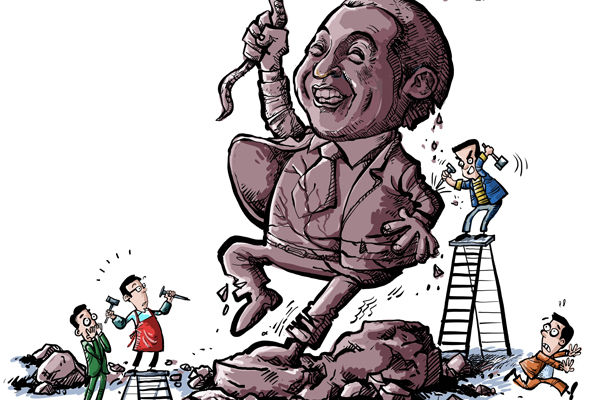Lords of illusion
Updated: 2013-08-03 02:51
By Raymond Zhou (China Daily)
|
||||||||
Behind the magic acts put on privately by some self-proclaimed masters of qigong lies a much more dexterous skill of pulling strings and massaging the egos of China's rich and powerful.
The downfall of a qigong master does not start with the loss of physical prowess; it usually starts with unwanted limelight, such as the visit of e-commerce doyen Ma Yun, kung fu superstar Jet Li and actress-turned-director Zhao Wei.
When the trio of luminaries descended upon the palatial home of Wang Lin in a county town in Jiangxi province, the media spotlight followed their footsteps. As a matter of fact, Master Wang did not eschew it. He devotes two floors (out of a total five) to the exhibition of photos he has taken with celebrities and prominent officials. He loves showing reporters around this personal gallery and reminds them to focus well before taking snapshots of his photo collection. Or at least he used to before the press turned against him.
 |
|
Pang Li / China Daily |
Wang Lin hangs around with the rich and powerful, but he was hitherto not publicly known. Unlike the movie stars who made a pilgrimage to him, he does not need a mass market to thrive. As he likes to point out, a businessman paid him 17 million yuan ($2.77 million) for"tuition"."It's not against the law that I accepted it" is his catchphrase.
And I must add that no press reports say he teaches qigong for a fee. Local authorities are reportedly investigating him for possibly practicing medicine without a license.
What Wang practices could be more psychological than traditionally medical. In a sense, he is like an exorbitantly priced career counselor aided by the self-claimed mastery of psychic power. His signature feat is a magic act that fills an empty basin with a live snake. Only he does not call it a magic trick or an illusion, but some kind of supernatural power endowed upon him by some mythic force or a lifetime of qigong training.
Reading about Wang Lin, I couldn't help think of similar"masters" I have encountered. In recent years I have noticed that a business crowd often features an imposing figure donning a traditional garb. He — I've yet to see a woman in this role — would talk in cryptic language, such as"All the troubles in the world can be boiled down to one word".
It's not just what he says, but how he says it. He would have a grand presence, occasionally supplemented by skills such as playing the guqin or writing brush calligraphy. Forget about karaoke, which is for the common people who dream of becoming pop singers. Many of these grand masters are indeed good performers. They know how to work a room and how to command attention, and consciously or not there are always some in the audience who would jump into the supporting roles of adoring fans. Without their oohs and aahs, the masters would be unable to carry on. They are not familiar with Shakespearean soliloquy, you know.
Sometimes I fantasize about two or more of these masters in one room. Because they seem to demand nothing less than absolute subordination, they come off as the next Confucius or a modern embodiment of Jesus Christ. If you force them to debate or put them in an event like a television reality show, I'm sure they'll strip each other of that saintly facade.
There is nothing wrong with knowing a trick or two or loving to entertain a crowd with it. It's just that one should not use this to paint oneself as a spiritual leader. In the old days, voodoo artists would walk around villages but nowadays they have found it's much more profitable to enchant the super-wealthy, who may have access to all the material things in the world but somehow have left a vacant spot in their inner worlds.
Why do people on a spiritual quest end up in the lairs of quacks and amateur magicians? The absence of religion could be one cause. More importantly, I believe, is the blurring of the line between religion and science. If you want to achieve a higher state of awareness, you may try a religion; and if you want to cure a disease, go consult a doctor. But some Chinese seem to desire a one-for-all solution. And guess who is willing to promise them that?
The distinction between magic and extrasensory perception is also something some tend to muddle. For those already prone to faith in the supernatural, seeing an unbelievable act is enough to tip over to the other side. If a guy can make a snake appear and disappear right in front of your eyes, it must be credible that he can send energy over thousands of miles to remotely cure or kill a person as he claims.
Had Wang Lin been a regular consultant, he might have been sued many times over. Several officials who had been his clients were guaranteed a lifetime of steady ascent up the official ladder but are now in big trouble. Such a glaring lack of efficacy would have raised eyebrows in any other profession, but here clients tend to blame themselves for it.
There was a boom in psychic masters in the early 1990s when some of them commanded audiences in the millions and claims of supernatural powers went wild. One would say he could move objects a province away, and another would allege he could cure a cancer patient across the Pacific Ocean, all with nothing but psychic power. If what they said were true, China would not need a military force because these masters would be able to pinpoint any enemy target anywhere in the world and destroy it without firing anything other than the invisible qi.
If you think China has a vibrant scene for fantasy or sci-fi fiction, you're dead wrong. These masters seem to pick and choose feats from existing literary creations but never contribute to them. For example, they have never claimed to be able to fly, which is a common attribute of this genre. If any of them had a fraction of JK Rowling's imagination, they would have built something like Hogwarts rather than a gilded castle that screams nouveau riche.
Now, I do not intend to discredit qigong wholesale. It is a totally legitimate practice with tangible health benefits. I'm also aware of the ongoing experiment to control a computer cursor with brain waves and occasional reports from the legit press about certain individuals' extrasensory abilities. Before conclusive evidence is presented by the scientific community, I'm willing to keep my mind open. But that does not mean I'll equate what I see in kung fu movies with what is physically possible in real life. Otherwise, there's no need for special effects.
Other countries have crystal-ball gazers and palm readers as well, like Whoopi Goldberg's role in Ghost. Being small-time entertainers, they'll never get a chance to hobnob with movers and shakers as Wang Lin does. Well, except for the fortune-teller hired by Nancy Reagan.
Over here, they have the potential to wreak havoc a la Rasputin, at least within a small circle. But examined from the perspective of character portrayal, these people are endlessly fascinating. You have to give them credit for the right mix of fortune-cookie wisdom, psychobabble, stage presence and mannerisms. They could well have been stage masters mouthing immortal lines of the bard, if they had stumbled early on into a drama academy.

 Berlusconi loses final appeal in landmark case
Berlusconi loses final appeal in landmark case
 Birds flock together to boost police ranks in Xinjiang
Birds flock together to boost police ranks in Xinjiang
 Right royal piece of paradise
Right royal piece of paradise
 Foreign carriers compete in 2nd-tier cities
Foreign carriers compete in 2nd-tier cities
 Urban push
Urban push
 Snowden granted 1 year's temporary asylum in Russia
Snowden granted 1 year's temporary asylum in Russia
 US kidnapper of 3 girls gets life in prison
US kidnapper of 3 girls gets life in prison
 China sails through 'first island chain'
China sails through 'first island chain'
Most Viewed
Editor's Picks

|

|

|

|

|

|
Today's Top News
China, US hold dialogue on human right
FM urges restraint on sea issues
US issues travel alert over attacks
Relaxation of one-child policy still being mulled
Forum fights desertification
US urged to ease exports ban
Farmers see hope of city life in hukou reform
Singer's fake bomb threat sparks debate
US Weekly

|

|







